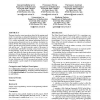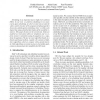393 search results - page 66 / 79 » Probabilistic Description Logic Programs |
134
click to vote
AGP
1994
IEEE
15 years 6 months ago
1994
IEEE
Kowalski and Sergot's Event Calculus (EC) is a formalism for reasoning about time and change in a logic programming framework. From a description of events which occur in the...
118
Voted
ENTCS
2002
15 years 2 months ago
2002
Practical declarative multi-paradigm languages combine the main features of functional, logic and concurrent programming (e.g., laziness, sharing, higher-order, logic variables, n...
135
click to vote
WWW
2004
ACM
16 years 3 months ago
2004
ACM
The paper describes some innovations related to the ongoing work on the GSA prototype, an integrated information retrieval agent. In order to improve the original system effective...
127
click to vote
SIGSOFT
2007
ACM
16 years 3 months ago
2007
ACM
Model checking techniques have traditionally dealt with temporal logic languages and automata interpreted over -words, i.e., infinite in the future but finite in the past. However...
DATE
2006
IEEE
15 years 8 months ago
2006
IEEE
Scheduling is an important step in high-level synthesis (HLS). In our tool, we perform scheduling in two steps: coarse-grain scheduling, in which we take into account the whole co...


